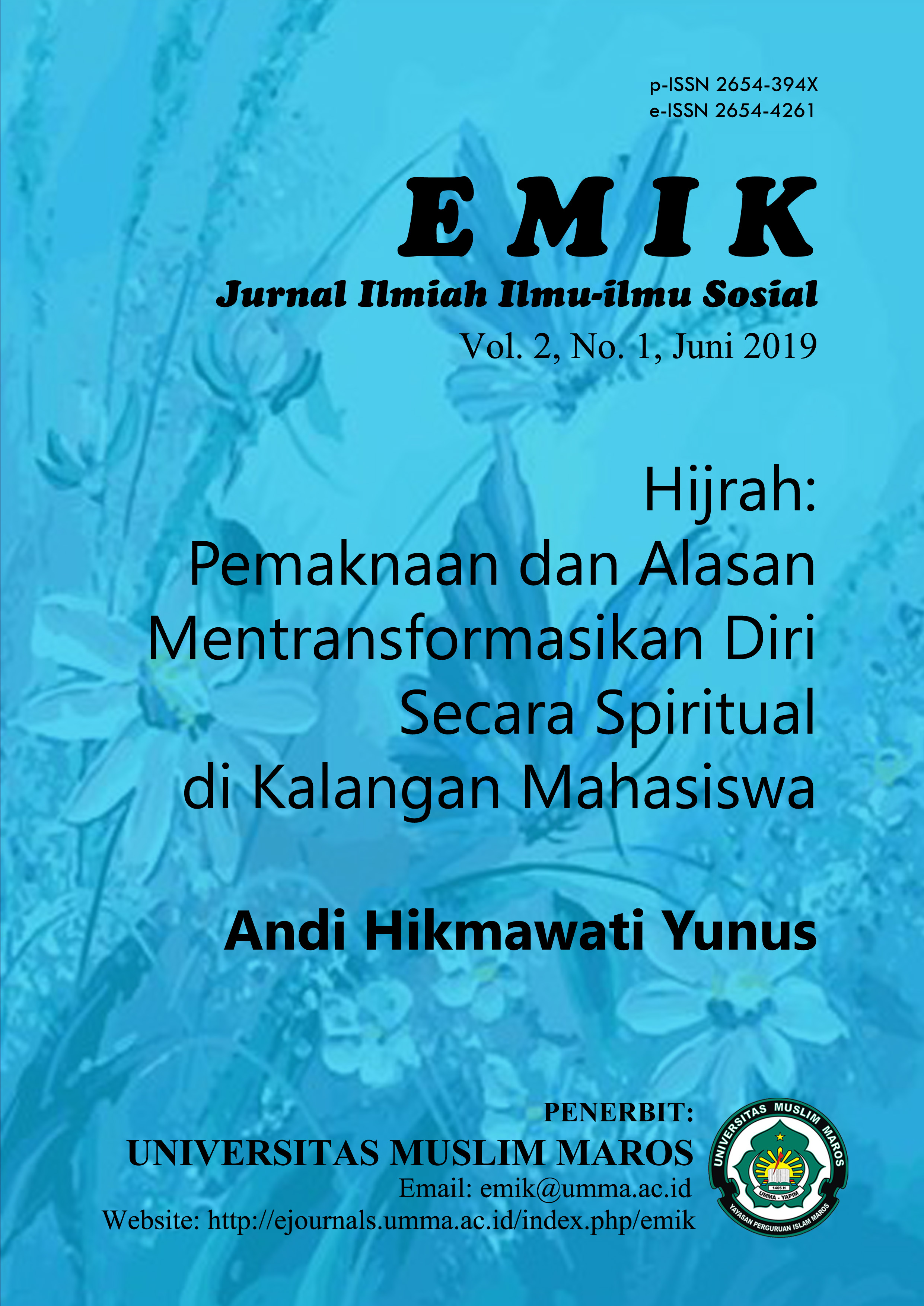Hijrah
Pemaknaan dan Alasan Mentransformasikan Diri Secara Spiritual di Kalangan Mahasiswa
Keywords:
Hijrah, Students, Transform, Gender, ReligionAbstract
In Indonesia, the word hijrah today is no longer identified with the movement of the Prophet Muhammad and his followers from Mecca to Medinah, the meaning of hijrah is nowadays increasingly widespread, including human spiritual transformation. Although there are a number of literatures on the meaning of hijrah and its transformation that follow, this study focuses on how students interpret hijrah and how and why they transform themselves.
This studi was conducted at Hasanuddin University, Makassar, Using phenomenological approach, I combined in-depth interview and observation as my data collection methods. Fourteen students participated in this study, consisting of seven women and men respectively who are actively involved in religious studies and/or da’wah (proselytizing) organization.
The studi shows that hijrah for students is interpreted in terms of transforming in terms of physical appearance through styles of dress and ways of behaving, as well as efforts to increase religious knowledge. If the style of dress is the main indicator of the physical appearance of women who are hijrah, then for men, growing beard and wearinf shorter pants are related to individual preferences. Therefore, for women, changes in behavior are closely related to changes in appearance, while for men changes in behavior are interwoven with efforts to increase religious knowledge through various media (such as religious studies, preaching, etc.). This indicates that this meaning does not stand alone, there are interrelationships, but they are differed by gender. Three underlying reasons why someone spiritually transform him/herself, namely romance experience, the influence of family environment, the influence of social environment, the influence of campus environment with its specific rules on student organizations.
References
Al-Abraar, M. N. 2018. Konsep Hijrah Dalam Perspektif Tafsir Fi Zhilalil Quran dan Al-Jawahir. Skripsi, Fakultas Ushuluddin, UIN Sunan Gunung Djati, Bandung.
Aswadi. 2011. “Reformulasi Epistemologi Hijrah dalam Dakwah’. Islamica: Jurnal Studi Keislaman, 5(2):339-353.
Daulay, M. 2015. "Peran Organisasi Dakwah dalam Pelaksanaan Bimbingan dan Penyuluhan." HIKMAH: Jurnal Ilmu Dakwah dan Komunikasi Islam 8(1): 98-106.
Departemen Kesehatan Republik Indoneisa. 2015. “Situasi Kesehatan Reproduksi Remaja” http://www.depkes.go.id/article/view/15090200001/situasi-kesehatan-reproduksi-remaja.html, diakses tanggal 19 April 2019.
Ibrohim, B. 2016. “Memaknai Momentum Hijrah”. Jurnal Ilmiah Pendidikan, 10(2):65-74.
Ismail, M.T. dan Abidin, Z. 2017. “Kontekstualisasi Hijrah Sebagai Titik Tolak Pembaharuan Pendidikan”, Suhuf, 29(1): 50-65.
Malia, I. 2018. “Eksklusif: Mengenai Gagasan Gerakan Indonesia Tanpa Pacaran”. https://www.idntimes.com/news/indonesia/indianamalia/eksklusif-mengenal-gagasan-gerakan-indonesia-tanpa-pacaran-1, diakses tanggal 19 April 2019.
Minhal, A. 2012. “Bersama Orang Tua Menuju Surga” https://almanhaj.or.id/3348-bersama-orang-tua-menuju-surga.html, diakses tanggal 20 April 2019.
Nisa, E. F. 2018. "Social Media and the Birth of an Islamic Social Movement: ODOJ (One Day One Juz) in Contemporary Indonesia." Indonesia and the Malay world 46 (134): 24-43.
Prasanti, D. dan Indriani, S. S. 2017. “Interaksi Sosial Anggota Komunitas LET’S HIJRAH dalam Media Sosial Group LINE”. Jurnal The Messenger, 9(2):143-152.
Sari, A. N. dan Mahadian, A. B. 2018. “Perilaku Komunikasi Pelaku Hijrah”. Linimasa: Jurnal Ilmu Komunikasi, 1(1):1-21.
Setiawan, E.; Desiana, F. I.; Wulandari, W.; dan Salsabila, I. 2017. “Makna Hijrah Pada Mahasiswa Fikom Unisba di Komunitas (Followers) Account LINE@ Dakwah Islam”. Mediator: Jurnal Komunikasi, 10(1): 97-108.
Tyas, P. P. 2012. “Regulasi Emosi Pasca Putus Cinta Pada Remaja Tahap Akhir”. Skripsi thesis, fakultas Psikologi, Universitas Muhammadiyah Surakarta, Surakarta.









9.png)















